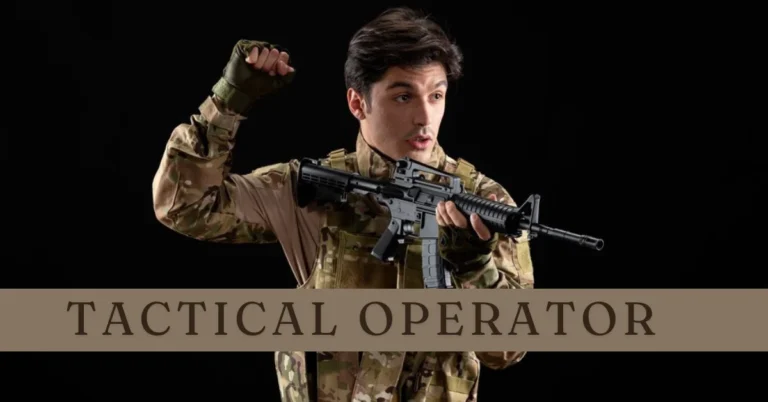Introduction to Tactical Operators
In a world where chaos can erupt at any moment, the role of a tactical operator shines bright as a beacon of hope and expertise. These highly trained individuals are often the unsung heroes behind critical missions that demand precision, strategy, and exceptional skill. Whether responding to hostage situations or carrying out counter-terrorism operations, tactical operators are on the front lines, ready to tackle challenges head-on.
But what does it take to become one of these elite professionals? The path is not easy; it requires rigorous training and an unwavering commitment to excellence. As we delve deeper into their world, we’ll uncover the unique skills they possess, the physical and mental demands they face daily, and even some real-life success stories that highlight their bravery.
If you’ve ever wondered about life as a tactical operator or considered whether this career might be right for you, you’re in for an enlightening journey. Let’s explore what makes these specialists vital in our society today.
Skills and Training Required for a Tactical Operator
Becoming a tactical operator demands a unique blend of skills and extensive training. Candidates must first demonstrate physical fitness, agility, and endurance. These attributes are crucial for high-stress situations.
Next comes firearms proficiency. Mastering various weapons is essential, as operators face unpredictable environments where quick decision-making can save lives.
Communication skills also play a vital role. Tactical operators often work in teams; clear communication ensures success during critical missions.
Technical knowledge is equally important. Operators need to understand surveillance equipment, navigation tools, and other advanced technologies that aid their operations.
Training programs typically include close-quarters combat techniques and crisis negotiation strategies. These disciplines prepare operators for diverse scenarios they may encounter in the field.
Mental resilience cannot be overlooked. The challenges faced by tactical operators require not just physical strength but also psychological fortitude to maintain composure under pressure.
Physical and Mental Demands of the Job
The life of a tactical operator is both physically and mentally demanding. These professionals are required to maintain peak physical fitness. Endurance, strength, and agility are essential tools in their arsenal.
Training sessions can be grueling. Operators often engage in high-intensity workouts that push their limits. They must also master advanced combat techniques, which require precision and coordination.
Mental resilience is equally crucial. Tactical operators operate under immense pressure during critical missions. Quick decision-making skills can mean the difference between success and failure.
Stress management becomes vital for maintaining focus. The ability to stay calm while navigating chaotic situations sets them apart from others in law enforcement or military roles.
Operators frequently face unpredictable scenarios that challenge their problem-solving abilities on the fly. Adapting swiftly ensures they remain one step ahead of potential threats or complications.
Equipment Used by Tactical Operators
Tactical operators rely heavily on specialized equipment to carry out their missions effectively. Each piece is designed for specific scenarios, enhancing both safety and efficiency.
Firearms are perhaps the most recognizable tools in a tactical operator’s arsenal. These include rifles, handguns, and shotguns, each selected based on the mission’s requirements. Accessories like suppressors and optics further aid precision.
Body armor plays a critical role in protection. Operators wear tailored vests that offer mobility while safeguarding against ballistic threats. Helmets equipped with communication systems enhance team coordination during operations.
Additionally, tactical gear often includes night vision goggles for low-light situations and advanced surveillance technology to gather intelligence discreetly.
Operators also carry medical kits to address injuries quickly, emphasizing readiness for unexpected challenges. The combination of these tools allows tactical operators to perform under pressure and achieve mission objectives efficiently.
Real-Life Examples and Success Stories
Tactical operators often find themselves in high-stakes situations that demand quick thinking and teamwork. One notable example is the rescue of hostages during a bank heist. A specialized SWAT team used precise tactics, communication, and strategy to swiftly neutralize the threat, ensuring the safety of everyone involved.
Another success story comes from counter-terrorism operations. Tactical operators played a crucial role in dismantling terrorist cells through intelligence gathering and covert surveillance. Their ability to work under pressure led to critical arrests before any harm could be done.
These stories highlight not just skill but also dedication. The bond formed among team members enhances their effectiveness during missions. Each operation reinforces their commitment to protecting communities while showcasing the tactical operator’s essential role in maintaining public safety.
Challenges Faced by Tactical Operators
Tactical operators face a myriad of challenges that go beyond physical demands. One significant hurdle is the unpredictability of their missions. Each situation can shift quickly, requiring them to adapt in real time.
Mental resilience becomes crucial as they often operate under high-stress conditions. The pressure to make split-second decisions can be overwhelming and may lead to burnout if not managed properly.
Team dynamics also play a vital role. Building trust with team members is essential for effective communication during operations. Any gap in this relationship can jeopardize mission success.
Additionally, tactical operators must navigate complex legal and ethical landscapes. They need to balance operational effectiveness with adherence to laws and regulations, which adds another layer of complexity to their roles.
Continuous training is necessary but presents its own set of challenges—finding time for personal life while honing skills can feel like an uphill battle.
Conclusion: Is Being a Tactical Operator Right for You?
Becoming a tactical operator is not for everyone. It requires a unique blend of skills, mental resilience, and physical stamina. The path to this career demands rigorous training and an unwavering commitment to excellence.
Potential candidates should reflect on their own abilities and lifestyle choices. Are you prepared to face high-pressure situations? Do you thrive in teamwork but can also operate independently when needed? Assessing these questions can provide clarity on whether this role aligns with your aspirations.
The challenges are significant, but so are the rewards. Tactical operators play crucial roles in safeguarding communities and tackling critical incidents head-on. If you’re passionate about service, problem-solving, and making an impact, it could be worth exploring further.
Understanding what being a tactical operator entails will help you make an informed decision about pursuing this demanding yet rewarding career path.
FAQs
Q: What is a tactical operator?
Ans: A tactical operator is a person with the knowledge, skill, and training to perform specific tasks successfully using intelligence and counter surveillance.
Q: What skills are essential for a tactical operator?
Ans: Essential skills include strategic planning, intelligence gathering, and counter surveillance.
Q: Why is intelligence important for tactical operators?
Ans: Intelligence is crucial for tactical operators as it helps them anticipate and plan for various scenarios effectively.
Q: What kind of training do tactical operators undergo?
Ans: Tactical operators undergo rigorous training in areas such as strategy, combat, surveillance, and emergency response.
Q: How do tactical operators prepare for their tasks?
Ans: They prepare by following a detailed plan based on gathered intelligence and counter surveillance techniques.

